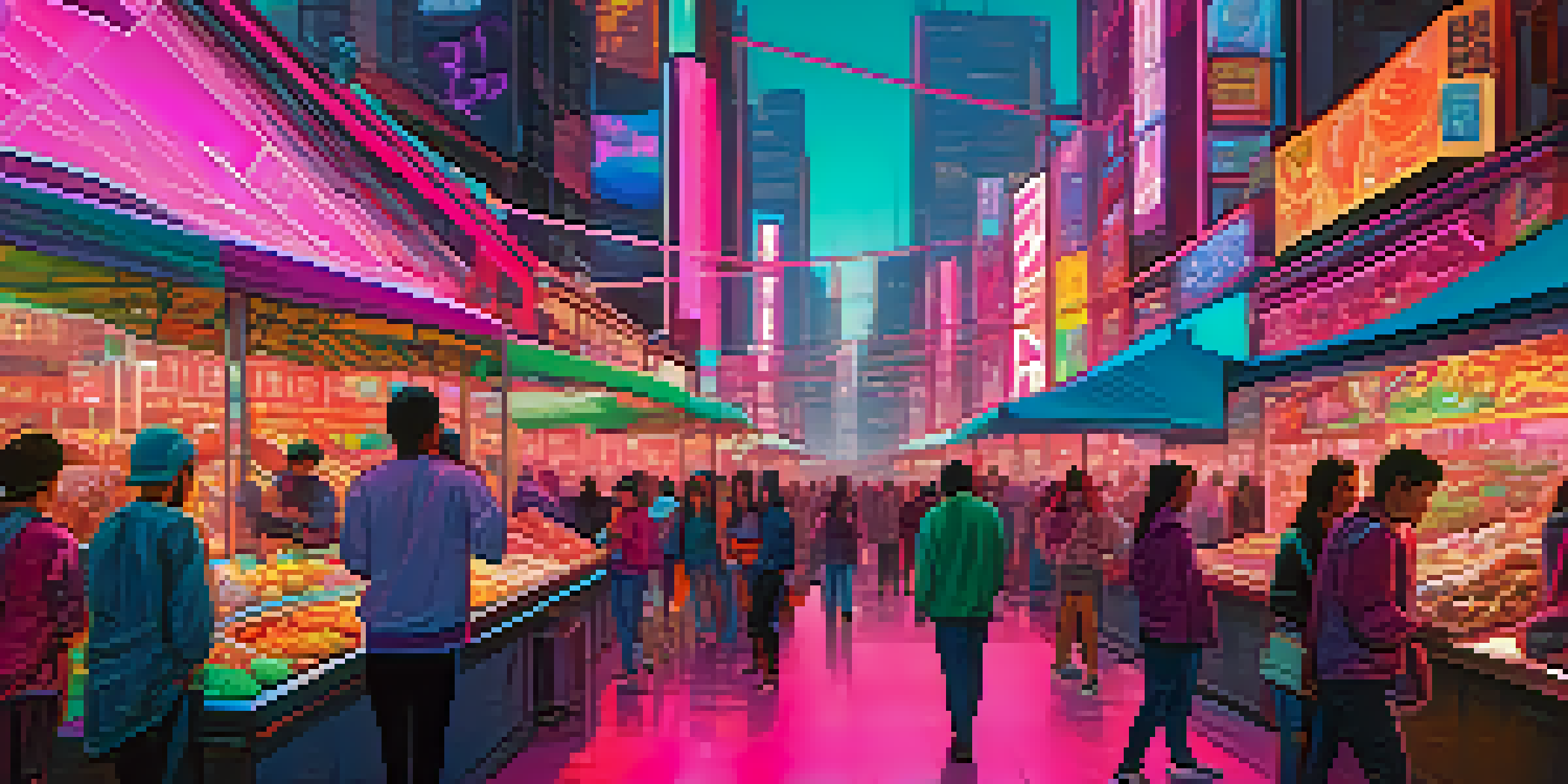The Rise of NFT Marketplaces: A New Digital Economy Emerges

Understanding NFTs: The Foundation of Digital Ownership
Non-fungible tokens, or NFTs, are unique digital assets verified on a blockchain. Unlike cryptocurrencies such as Bitcoin, which are interchangeable, each NFT has distinct characteristics that set it apart. This uniqueness allows creators to establish true ownership of digital items like art, music, and even virtual real estate.
NFTs are the future of ownership, and they will provide a new level of value and engagement that traditional assets cannot match.
Imagine owning a one-of-a-kind piece of digital art that can’t be replicated or forged. That’s what NFTs offer—proof of ownership that’s easily verifiable by anyone on the blockchain. This has unlocked new opportunities for artists and creators to monetize their work in ways that were previously unimaginable.
As more people recognize the potential of NFTs, marketplaces dedicated to these digital assets have begun to flourish, paving the way for a new digital economy. Platforms like OpenSea and Rarible are at the forefront, enabling users to buy, sell, and trade NFTs with ease.
The Evolution of NFT Marketplaces: A Growing Trend
NFT marketplaces have evolved rapidly since their inception, transforming from niche platforms to major players in the digital economy. Initially, they catered primarily to artists and collectors, but now they attract a diverse audience, including gamers, brands, and even celebrities. This evolution highlights the increasing mainstream acceptance of NFTs.

For instance, platforms have incorporated features like bidding systems and auction formats, similar to traditional art auctions. This shift not only enhances user experience but also creates a sense of excitement and urgency among buyers, driving up demand and prices for certain digital assets.
NFTs Redefine Digital Ownership
Non-fungible tokens provide unique proof of ownership for digital assets, enabling creators to monetize their work directly.
As more companies and individuals enter the NFT space, we can expect to see further innovation and expansion of these marketplaces, promoting a vibrant ecosystem where digital goods are traded like physical assets.
Economic Impact: Creating New Revenue Streams
The rise of NFT marketplaces is generating new revenue streams for creators and entrepreneurs alike. Artists can now sell their work directly to consumers without intermediaries, allowing for higher profit margins. This direct-to-consumer model empowers creators to build their brands and engage with their audiences in novel ways.
The digital world is changing. NFTs are not just a trend; they are a fundamental shift in how we perceive ownership and value.
Moreover, companies are recognizing the potential of NFTs to create brand loyalty and engagement. By offering exclusive digital collectibles or experiences, brands can cultivate a dedicated following that feels a personal connection to their products. Think of it as a digital loyalty card, but with unique, collectible value.
As businesses explore the monetization possibilities of NFTs, we're witnessing a shift in how value is perceived and exchanged in the digital landscape, leading to a more vibrant economy centered around digital ownership.
Challenges Facing NFT Marketplaces: Navigating the Hurdles
Despite their rapid growth, NFT marketplaces face several challenges that could impact their longevity. Issues like high gas fees on transactions and environmental concerns related to blockchain energy consumption are at the forefront of discussions. These hurdles can deter users from entering the space, especially those who may be eco-conscious.
Additionally, the NFT market is still subject to speculation, leading to price volatility that can be alarming for new investors. It's not uncommon to see a digital asset's value skyrocket one day and plummet the next, making it a risky venture for those unfamiliar with the market dynamics.
NFT Marketplaces Are Expanding
The evolution of NFT marketplaces is attracting a diverse audience, driving innovation and increasing mainstream acceptance.
To navigate these challenges, marketplaces are exploring solutions, such as layer-2 scaling technologies and more sustainable blockchain alternatives. Addressing these issues is crucial for ensuring the long-term viability and growth of the NFT ecosystem.
Cultural Shift: NFTs and Digital Identity
NFTs are not just changing the way we buy and sell; they are also reshaping our digital identities. By owning NFTs, individuals can express their interests and values in unique ways, curating a digital persona that reflects their passions. This cultural shift is akin to how people display art or collectibles in their homes.
For instance, gamers are now able to showcase their achievements or rare items through NFTs, creating a new dimension of identity in virtual spaces. This adds a layer of personalization that enhances the gaming experience and fosters community among players.
As this trend continues, NFTs may become integral to how we identify ourselves online, influencing everything from social media profiles to virtual reality environments.
Future Outlook: What Lies Ahead for NFT Marketplaces
Looking ahead, the future of NFT marketplaces appears bright, with ongoing technological advancements and increasing user adoption. Innovations such as fractional ownership of NFTs and cross-chain compatibility could further broaden accessibility and appeal to a wider audience. Imagine being able to co-own a digital artwork with friends, making it more affordable and communal.
Moreover, as more industries explore the benefits of NFTs, we may see new applications emerging beyond art and collectibles. For example, real estate, fashion, and music are already experimenting with NFTs to offer unique experiences and ownership models.
Challenges in the NFT Space
NFT marketplaces face hurdles such as high transaction fees and environmental concerns that must be addressed for sustainable growth.
Ultimately, the potential of NFT marketplaces to revolutionize digital ownership is just beginning to unfold. As they continue to evolve, they could redefine the way we perceive value and ownership in the digital age.
Conclusion: Embracing the NFT Revolution
In conclusion, the rise of NFT marketplaces is heralding a new digital economy that challenges traditional concepts of ownership and value. As more individuals and businesses embrace this revolution, we can expect to see innovative uses and applications of NFTs across various sectors. The excitement surrounding NFTs is not just about the technology but also about the new relationships being formed around digital assets.
While challenges remain, the opportunities presented by NFT marketplaces are immense, creating a vibrant space for creativity, engagement, and commerce. Whether you’re an artist, a collector, or someone simply curious about the trend, understanding NFTs can open up new avenues for exploration and investment.

So, are you ready to dive into the world of NFTs? The digital economy is evolving, and the possibilities are as limitless as your imagination.